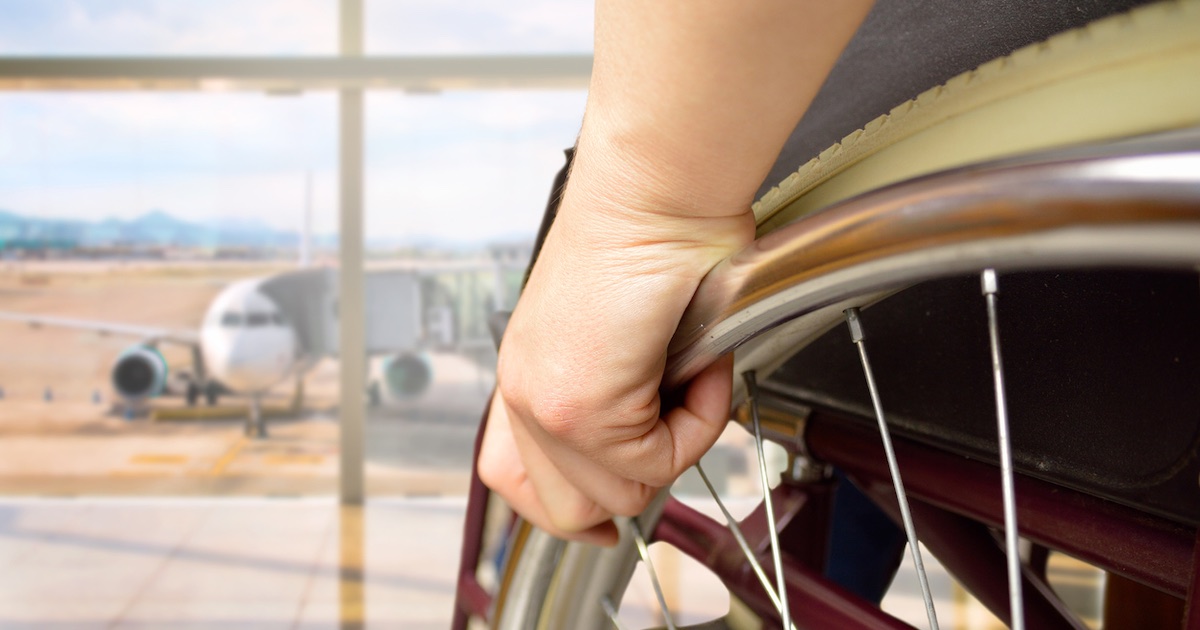
21 Dec 2023 Mark Mostert: Airlines Need To Do Better To Support People With Disabilities
“Recent reports make clear that passengers with disabilities are not a priority for airlines, writes Dr. Mark Mostert of Able Americans.
In a commentary published at Issues & Insights, Mark describes several recent examples of airlines failing people with disabilities, and he concludes:
It’s imperative that corporations, airlines included, meet the challenge of accommodating and supporting people with disabilities using free market approaches and common sense.
Mark’s commentary is below.
Corporations, including airlines, exist to make a profit for their shareholders. One way of ensuring significant profit margins is to provide outstanding customer service.
In the middle of the holiday season, millions of people will travel by air. These days air travel is almost uniformly a trying experience for everyone, and even more so for people with disabilities. In most airports, for example, they battle massive check-in crowds, often struggle to get through airport security and sometimes have to negotiate very long distances from one gate to another. On planes they are up against tiny bathrooms, tight seat spaces, enplaning and deplaning issues, crowded flights and untrained transportation staff.
Making air travel efficient and safe for passengers with disabilities would seem to be a no-brainer – and even offer the airlines that embrace them a competitive advantage.
But the airline industry apparently didn’t get the memo. Recent reports make clear that passengers with disabilities are not a priority for airlines, despite the usual cosmetic acknowledgement that people with disabilities actually exist.
Here are some recent highlights, or more aptly said, lowlights:
– One passenger uses a wheelchair and a portable ventilator to breathe. Prior to arriving at the airport, she provided the airline with extensive medical documentation to smooth the way. When she checked in, that information had gone missing. After the documentation issue was finally resolved, things just got worse. Hapless flight attendants and ground staff repeatedly disconnected her ventilator tube as they tried to manhandle her onto the plane. They also dropped part of a lifting device on her head. All of this before a grueling nine-hour flight. Her return trip wasn’t much better. After her ordeal, she noted that she “did not feel safe.” Probably the understatement of the year.
– Another passenger, flying home with his wife after an anniversary trip, needed help getting off the plane. A wheelchair user with cerebral palsy and unable to walk, he was forced to literally drag himself off a flight after cabin staff informed him that there wasn’t enough time to get him a modified airport wheelchair to help him deplane. He ended up dragging himself from row 12, his wife crawling behind to help him as all the other passengers looked on.
– One more travel nightmare: A young man, also with cerebral palsy, was accustomed to being lifted from his airplane seat using a special lift. When the specialized contraption was unavailable, ground crew insisted that they could manually strong-arm the passenger out of his seat. Predictably, doing so was a struggle, and it took over an hour and a half to get him off the plane. Ground crew finally dropped him while trying to get him out of his seat. He then spent several days in bed recovering from his ordeal.
In all these instances the airlines issued the usual bland apologies. These experiences might have been unsurprising had they happened 50 years ago when very few, if any corporations and businesses were aware of people with disabilities.
In 2023, it’s not acceptable.
Some points to consider:
– Why aren’t airline personnel better trained in accommodating passengers with disabilities?
– Do all airlines have a comprehensive, documented plan for accommodating passengers with a wide variety of disabilities?
– Why does it take unsettling events to get airlines’ attention?
People with disabilities spend billions of dollars each year in disposable income; they deserve much better from airlines – and every other corporation.
At Able Americans we believe in innovative solutions for people with disabilities that harness the free market, emphasize individual freedom and choice and remove barriers to progress.
It’s imperative that corporations, airlines included, meet the challenge of accommodating and supporting people with disabilities using free market approaches and common sense.
Mark P. Mostert, Ph.D. is senior researcher at Able Americans, the National Center’s project to support Americans living with intellectual, developmental and physical disabilities. This was first published at Issues & Insights.





